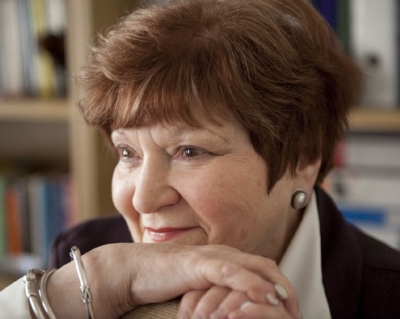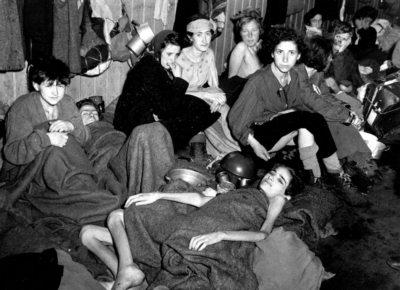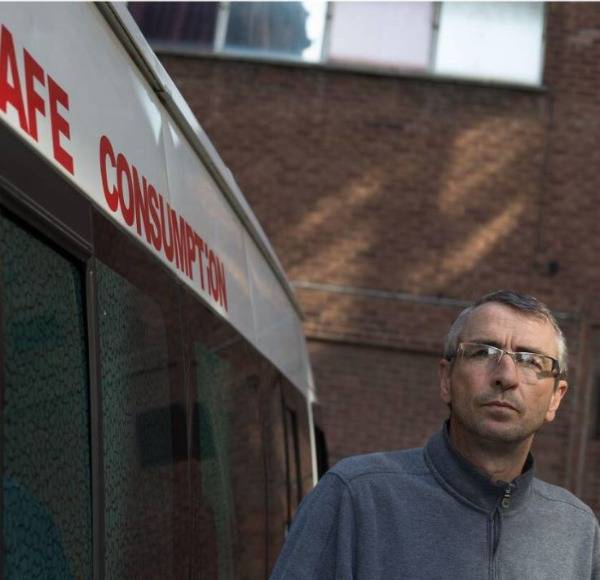
The war brings her father’s worst fears to pass. A stream of refugees from Germany passes through their house with gruesome tales to tell. They gather round the radio to hear the German radio broadcasts, which her father translates. Helen listens to everything. A year before the end of the war, 18-year-old Helen signs up as a volunteer with the Central British Fund, to try and do her bit when the war is finally won.
Now it’s 1945 and Helen is in Bergen-Belsen, the Nazi concentration camp in northern Germany to which she has come as an aide to Henry Lunzer, who is leading the relief effort. The camp is teeming with people, thousands and thousands of survivors from throughout Eastern Europe. They are trapped in the camp, cross-border travel is illegal, the iron curtain is rapidly falling, and many have no home to which they can return. The few that do try – some try to walk back to Poland, some ride on train roofs and risk decapitation – find their homes have been taken, the residents unwelcoming or violently hostile. No one wants to be reminded that many populations colluded with the Nazis to round up the local Jewish communities.

She spends hours walking the grounds of Belsen, past the earth mounds that cover the mass graves, and overhanging all is a sweet and sickly smell, the smell of human death, which is also, she says, the smell of a geranium crushed in your palm. “I came across this woman.” Bamber takes up the story, in an accent that mixes North London and the RP English of the ’40s. “She was rocking – everyone rocked back then. She grabbed hold of me and dug her fingers into my arms. People had about them a smell, a decaying smell, and I thought to myself, ‘She’s not going to live very long.’ I sat on the ground with her and we rocked together and she rasped this story out.”
The woman spoke in Yiddish, the Jewish dialect Bamber had learnt, much to the disapproval of her Hochdeutsch father, which allowed her to communicate with the Jewish survivors from the East. “It was like a vomit, it came out in torrents. That her husband, her parents, her children, everyone had been killed. What had happened to her, that she had been in Auschwitz and had then come to Belsen.” As she recalls the scene Bamber looks off into the middle distance – it really does look as if she can see the woman still, and her eyes mist over, and so do mine. “When she had finished I said to her, ‘I can’t bring back the dead and I can’t change history, but I can tell your story and I can be your witness.’ When I said that, her whole body relaxed and I understood – though I knew very little about psychology – something very important, and that is that a survivor of man’s inhumanity to man requires a witness. This woman did not want to die without it being told. Without realising it I think I found what I needed to find in that moment.”
This story, and what she learned from hearing it, informs all the work she has done in the 67 years since that day. Throughout her professional life as a therapist and an advocate for those who have suffered extremes of human cruelty, it has been the act of listening to and then telling the stories of those who have suffered – an active witnessing – that defines her. Whether working in hospitals, with Amnesty International, as she did from 1980 to 1985, or, since 2005, through her own Foundation, she has always worked to unburden the survivors and speak on behalf of those she calls “my people”.
Despite the Jewish atmosphere of her upbringing, and her father’s enthusiastic embrace of Judaism in later life, Helen never believed in God, but she was “always searching for something”, a way to keep her family and loved ones safe, but also a way to escape from her melancholy home and some way of making sense of the catastrophic damage humans do to each other. She found it in her capacity to sit still and listen to the most appalling tales, and to pass on what she has heard: “witnessing and telling a story was the only skill I could find in myself, and I’m still doing it today.” From its calm offices in Covent Garden, the Helen Bamber Foundation provides services, support and companionship for victims of torture, exploitation and genocide from over 90 countries, many of them asylum seekers. Helen is their advocate with the British Border Agency, government departments and services, but she is also the recorder of their experiences – her office shelves are weighed down with folders containing, I imagine, the worst humanity has to offer.
As she turns 86, the twinkle in her eye undimmed, I wonder what she has learnt about human nature from hearing these grim and gruesome tales. Does she, in the light of such atrocities, and the absence of the consolations of religion, maintain hope? “I do have hope otherwise I don’t think I could do the work I do. I am privileged to work with survivors and I can see in them their humanity. Yesterday I was with a woman from Rwanda who saw her husband and children cut to pieces with machetes in front of her eyes. It’s beyond imagination. But I have seen her sing, and paint and bake bread. I see that people who have been exposed to unbelievable disasters and loss can hold on to their humanity.”
As for human nature, she has learned that “everyone has the capacity for evil”. But it is not the evil that is interesting to her, but “the fact that people don’t give in to that capacity”. How survivors retain their humanity despite the inhumane treatment they have received is the real heart of the story.
Bamber is fascinating on the art of advocacy. She learned a harsh lesson about the limits of compassion when she first returned from Belsen. Eager to tell what she had seen, she visited Jewish groups and held public meetings to communicate the horrors, but this was ineffective. An exhausted nation with troubles of its own didn’t want to hear about it. She found a climate of disbelief and denial: “Jewish people here couldn’t bear it.” She learnt eventually to change her tone, not to demand “forgiveness and compassion” from people who weren’t ready, to soften her timbre, even to use humour.
“I’ve seen extraordinary extremes of humanity, but I also see a kind of banal cruelty of indifference. But why should people who are suffering cutbacks be concerned about somebody who who has seen their husband and children killed in front of them? For some religion might provide the answer, but I can only answer it in terms of myself and my family: the people that I see that are no different than I am, they just had the misfortune to be born somewhere else. It’s not easy and I’m not always successful but I want to find the language to convince that we all have a duty to the stranger, to the people that we owe nothing.”
Find out more about the work of The Helen Bamber Foundation: www.helenbamber.org

